View Larger Image
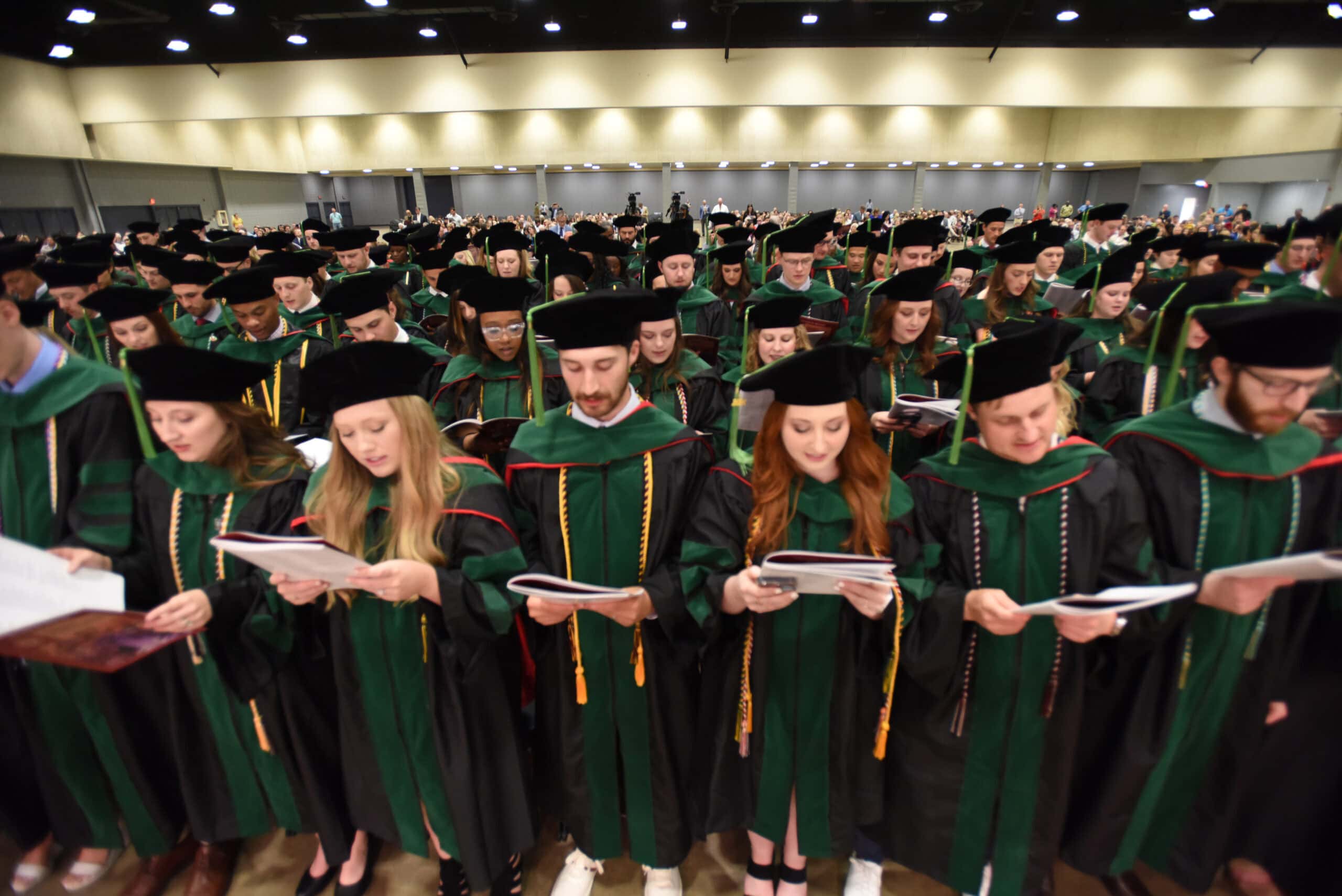
The UAMS College of Medicine Class of 2024 recites the Hippocratic Oath with Dean Steven Webber, M.D.
Image by JohnPaul Jones
College of Medicine Class of 2024 Reminded to ‘Calm Down’ as they Move Forward
| The 168 members of the College of Medicine Class of 2024 donned their doctoral hoods and jointly recited the Hippocratic Oath after being showered with words of wisdom at their May 17 honors convocation.
The following day, after receiving their degrees at a campus-wide commencement ceremony, they became the latest group of physicians from the University of Arkansas for Medical Sciences (UAMS) to begin fanning out across the country to continue their training at residencies in Arkansas and 26 other states.
Steven Webber, M.D., dean of the college, was one of several UAMS leaders who offered departing accolades and advice during the Friday night honors ceremony from a stage in a cavernous hall at the Statehouse Convention Center in downtown Little Rock.
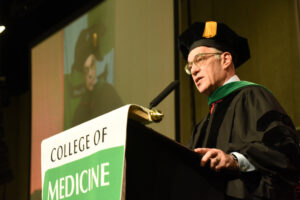
Steven Webber, M.D., UAMS executive vice chancellor and dean of the College of Medicine, addresses the Class of 2024.
Webber told the graduates that they were about to begin careers in “perhaps the most fulfilling profession of all, in my biased opinion.”
He said that while he knows they will succeed as physicians, they shouldn’t let their work become their whole lives. He reminded them that “medicine is far more what we don’t know than what we do know,” and that it will surely continue to evolve in ways not currently anticipated. But through it all, he said, “it is essential to maintain outside interests,” including personal relationships.
That sentiment echoed some of the remarks recorded earlier by UAMS Chancellor Cam Patterson, M.D., MBA, and played at the event, while he attended his son’s simultaneous graduation ceremony.
Patterson told the graduates that they are entering the health care profession at an exciting time technologically, with “amazing tools” at their fingertips. But, mentioning artificial intelligence in particular, he said it’s important to not get so caught up in the technology that “you lose sight of patients.”
Patterson reminded the graduates that “medicine is first and foremost a profession of obligations to society,” and requires physicians to “act in the best interests of others.”
He also encouraged them to “have faith in yourself, don’t be afraid and keep moving.”
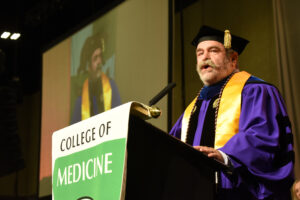
Alan Diekman, Ph.D., entertains the audience as he delivers the faculty address to the Class of 2024.JohnPaul Jones
The class chose Alan Diekman, Ph.D., a professor of biochemistry and molecular biology, to deliver the faculty address, and Diekman used the opportunity to inject some humor into the otherwise weighty ceremony.
He recalled an incident that occurred during the COVID-19 pandemic, which resulted in his three-hour classes about biochemistry and endocrinology being held virtually for nine weeks in the graduating students’ first year and five weeks in their second year.
“Often, I told my colleagues that I felt that I was presenting a morning TV talk show,” Diekman said. “We were physically isolated, but we caught glimpses of each other in our homes, maybe with family members or pets.”
Meanwhile, he said, “the chat function, which permitted a level of discourse that would not happen if we were meeting in person, was always very active in class.”
He said it was through that function that “one of your classmates gave me some of the best advice I have ever received.”
Diekman said he can’t remember the subject on which he was pontificating — “let’s pretend it was an erudite exposition on glycolysis, in which I believe I twice used the word ‘behoove’” — when a chat message popped up that had been shared to the entire class. It said, “Calm down, Alan.”
As he repeated the phrase and ripples of laughter filled the hall, Diekman recalled that “I was momentarily speechless — not because I was told to calm down or because I was addressed by my first name, but because of how hysterically funny I thought it was.”
“I knew humor was the intent — I wasn’t upset,” he clarified. “I suspect some of you were also astonished when you saw that chat message, and I still laugh thinking about it. It’s one of my favorite stories to tell of my experiences as an educator.”
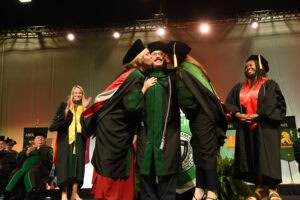
Eric Porter, a class favorite, is congratulated onstage. His peers gave him the Leonard Tow Humanism in Medicine Award, which recognizes compassion in the delivery of medical care.
But his reason for sharing it, he said, is that “it is a memory of your class that I hold dear, and I realized it was some of the best advice anyone could receive during a pandemic. Calm down, Alan. It reminds me of the poster, ‘Keep Calm and Carry On,’ and that’s what you did.”
Diekman said that to carry on during a pandemic, the class had to be resilient, adaptable and self-reliant. He said the classmates’ presence years later at the honors convocation proved that they had those attributes, which will serve them well in their medical careers.
“But being self-reliant doesn’t always mean going in alone,” he said. “You need to be honest about yourself regarding your abilities and your physical and mental limitations,” which includes not being afraid to call in a more experienced physician when needed.
“It will behoove you to remember you are resilient, you are adaptable, and you are self-reliant,” he said.
Then, as a grin spread across his face, he said, “I’ve been waiting to say this for three years: Calm down, Connor.”
With a nod to Connor Roset, the class representative who will soon begin an emergency medicine residency at UAMS (and who agreed beforehand to be mentioned in Diekman’s address), he stepped away from the microphone to hearty applause.
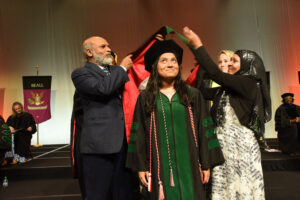
Tamanna Basri, president of the College of Medicine Class of 2024, is hooded by her parents.JohnPaul Jones
The class next heard from Class President Tamanna Basri, who will soon be heading to a psychiatry residency at the University of Texas Southwestern Medical School in Dallas. She urged her classmates to “continue to draw inspiration from each other” as they proceed to their next level of training as physicians and to remember that the bonds they forged with each other will linger long after graduation.
A series of award announcements to both faculty and students followed, until it was time for each student to walk across the stage as names were announced alphabetically, to have a shimmery green College of Medicine hood draped over their heads, atop their black robes, signifying their transition into physicians.